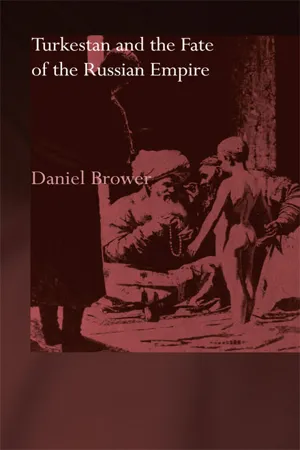
- 240 pages
- English
- ePUB (mobile friendly)
- Available on iOS & Android
eBook - ePub
Turkestan and the Fate of the Russian Empire
About this book
The central argument of this book is that the half-century of Russian rule in Central Asia was shaped by traditions of authoritarian rule, by Russian national interests, and by a civic reform agenda that brought to Turkestan the principles that informed Alexander II's reform policies. This civilizing mission sought to lay the foundations for a rejuvenated, 'modern' empire, unified by imperial citizenship, patriotism, and a shared secular culture. Evidence for Brower's thesis is drawn from major archives in Uzbekistan and Russia. Use of these records permitted him to develop the first interpretation, either in Russian or Western literature, of Russian colonialism in Turkestan that draws on the extensive archival evidence of policy-making, imperial objectives, and relations with subject peoples.
Frequently asked questions
Yes, you can cancel anytime from the Subscription tab in your account settings on the Perlego website. Your subscription will stay active until the end of your current billing period. Learn how to cancel your subscription.
No, books cannot be downloaded as external files, such as PDFs, for use outside of Perlego. However, you can download books within the Perlego app for offline reading on mobile or tablet. Learn more here.
Perlego offers two plans: Essential and Complete
- Essential is ideal for learners and professionals who enjoy exploring a wide range of subjects. Access the Essential Library with 800,000+ trusted titles and best-sellers across business, personal growth, and the humanities. Includes unlimited reading time and Standard Read Aloud voice.
- Complete: Perfect for advanced learners and researchers needing full, unrestricted access. Unlock 1.4M+ books across hundreds of subjects, including academic and specialized titles. The Complete Plan also includes advanced features like Premium Read Aloud and Research Assistant.
We are an online textbook subscription service, where you can get access to an entire online library for less than the price of a single book per month. With over 1 million books across 1000+ topics, we’ve got you covered! Learn more here.
Look out for the read-aloud symbol on your next book to see if you can listen to it. The read-aloud tool reads text aloud for you, highlighting the text as it is being read. You can pause it, speed it up and slow it down. Learn more here.
Yes! You can use the Perlego app on both iOS or Android devices to read anytime, anywhere — even offline. Perfect for commutes or when you’re on the go.
Please note we cannot support devices running on iOS 13 and Android 7 or earlier. Learn more about using the app.
Please note we cannot support devices running on iOS 13 and Android 7 or earlier. Learn more about using the app.
Yes, you can access Turkestan and the Fate of the Russian Empire by Daniel Brower in PDF and/or ePUB format, as well as other popular books in History & Asian History. We have over one million books available in our catalogue for you to explore.
Information
Table of contents
- Front Cover
- TURKESTAN AND THE FATE OF THE RUSSIAN EMPIRE
- Title Page
- Copyright
- Dedication
- CONTENTS
- Preface
- Illustrations
- 1 Russian Turkestan and the revolt of 1916
- 2 Constructing Russia’s new colony
- 3 The colony in the empire
- 4 Islam in Russian Turkestan
- 5 The making of a settler colony
- 6 Turkestan and the fall of the Russian empire
- 7 Epilogue: the colonial dilemma resolved
- Notes
- Selected bibliography
- Index